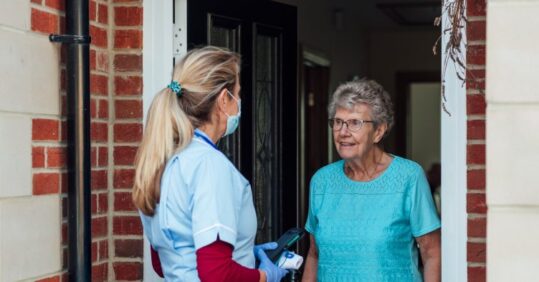NHS ‘failing to capitalise’ on district nurse expertise, warns QNI

The NHS is failing to capitalise on the skills, knowledge and experience of district nurses by instead focusing on specialist, single-task teams in the community, the QNI has said.
A report from the community nursing charity, released this week, warned the specialist teams are ‘effectively de-skilling the district nursing service’ by delivering care such as managing exacerbations, delivering intravenous antibiotics and caring for patients with central lines.
Related Article: New preceptorship package for social care nurses
This ‘creates confusion and adversely affects continuity of care’ for the patients, it concluded, adding: ‘The creation of such single task services may be simpler than training and developing a large number of practitioners but the impact on the continuity of patient care is significant.’
It also warned health services have ‘failed to adequately use’ the ‘skills, knowledge and experience’ of district nurses to manage patients at home who might otherwise need to go to hospital, despite widespread efforts to reduce unnecessary admissions.
But in 2018, around 4,000 of the 12,000 patients admitted to hospital each month in England stayed less than one day, it highlighted. Many of these are admitted unnecessarily with so-called Ambulatory Care Sensitive Conditions (ACSCs), which could be managed at home by district nurses.
The QNI argued the rising rates of emergency admission to hospital – rising from 7,000 a month in 2008 to 12,000 admissions in 2018, according to the Health Foundation – requires ‘radical’ solutions, beyond the ‘small in scale’ and ‘piecemeal’ changes to community services developed so far.
Related Article: Funded nurse workforce plan needed for neighbourhood health services
The QNI also urged UK governments to publish a ‘robust workforce plan’ for community nursing. District nurse numbers have significantly fallen – with 4,201 working in England as of August 2021, the latest figures available, down from 6,322 in August 2011.
QNI chief executive Dr Crystal Oldman said: ‘This report shows what could be achieved with a robust workforce plan for community nursing. Services need greater investment to ensure that patients get the high quality, holistic and planned care at home that they deserve.
Related Article: Nurse had to ‘freeze’ PPE during pandemic to re-use in care home, Covid inquiry hears
‘The QNI is committed to not only monitoring workforce pressures and development but also to develop innovative solutions for the healthcare challenges we face today and in the future.’
The report is from the QNI’s international community nursing observatory, launched in November 2019, which aims to better understand community nursing through data.

See how our symptom tool can help you make better sense of patient presentations
Click here to search a symptom




